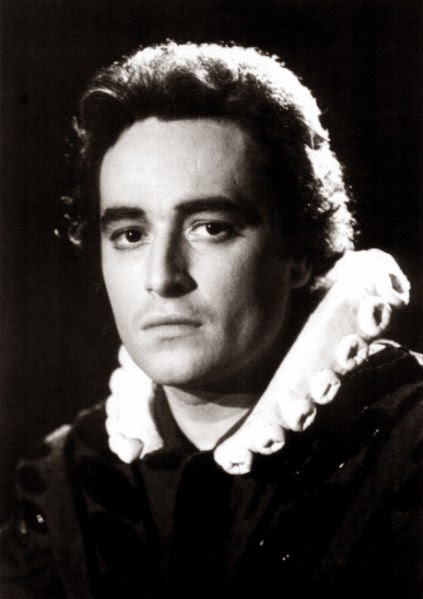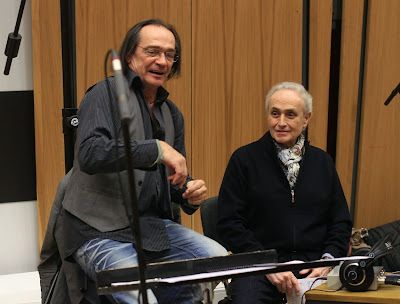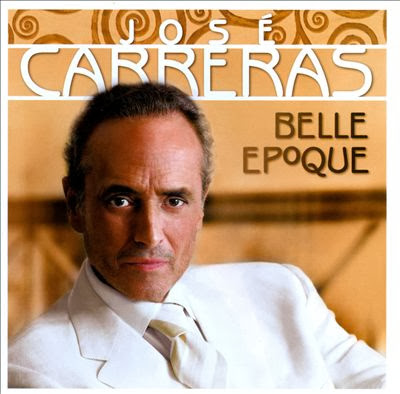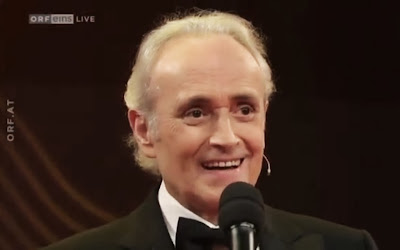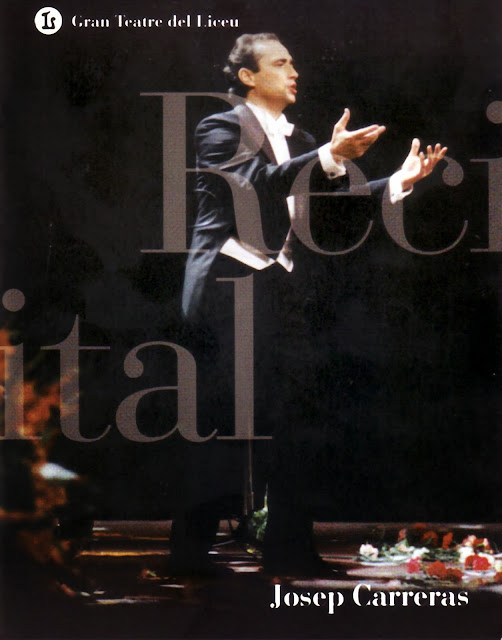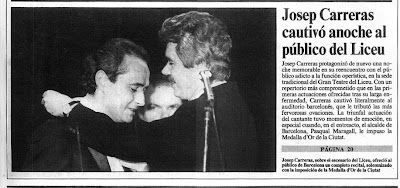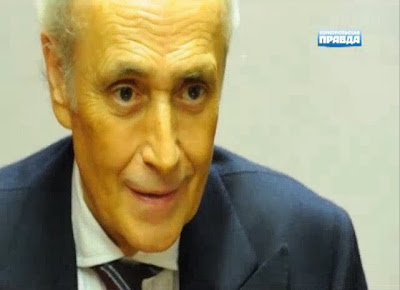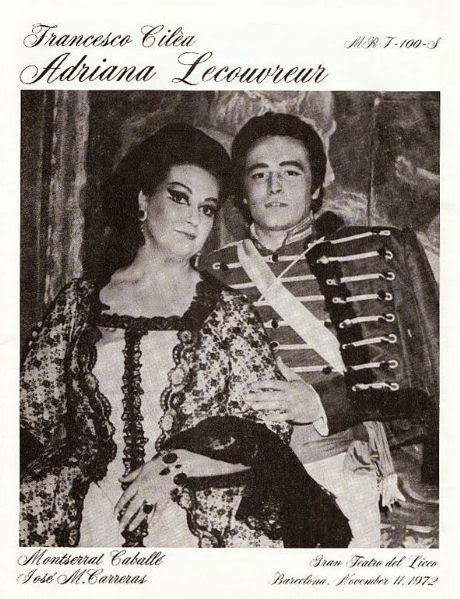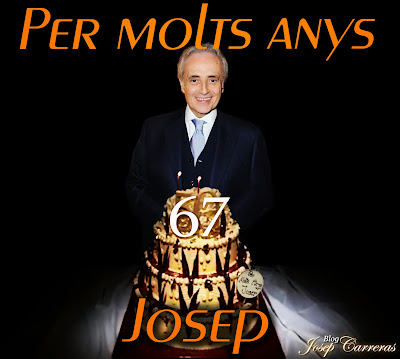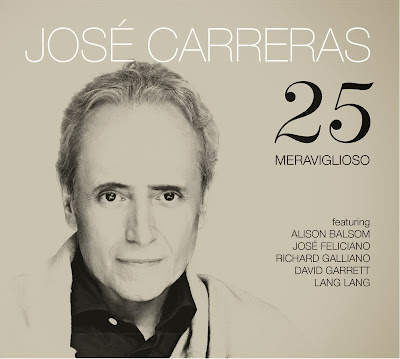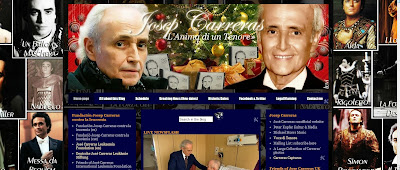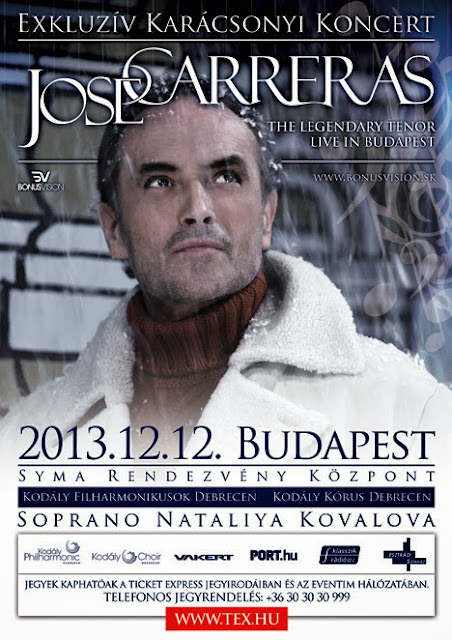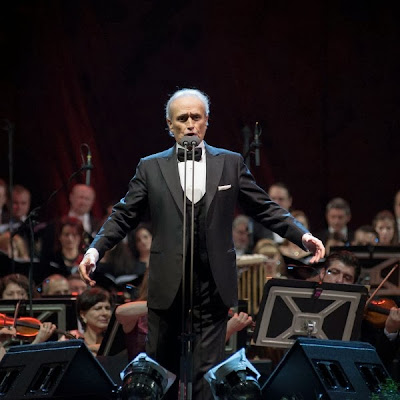Mercoledì scorso, 2 ottobre, Josep Carreras era atteso alla Royal Albert Hall di Londra per la cerimonia dei Classic BRIT Awards: il tenore catalano, di ritorno da Buenos Aires dopo un breve tour in Argentina, aveva riorganizzato le tratte del suo viaggio in modo da predisporre uno stop di 24 ore nella capitale britannica, al fine di poter tenere la laudatio in onore del suo grande amico Luciano Pavarotti, vincitore del premio postumo alla carriera, il Lifetime Achievement in Music Award del 2013.
Il grande tenore italiano avrebbe dovuto ricevere il premio nel 2007, ma non era stato possibile a causa della sua scomparsa il 6 settembre dello stesso anno. Il premio è stato consegnato a Nicoletta Mantovani Pavarotti, seconda moglie di Luciano.
www.classicbrits.co.uk
features.rr.com
www.gettyimages.it
VIDEOS
You Tube
You Tube
 |
| Josep Carreras on the red carpet of the Classic Brit Awards 2013 Photo: Getty Images |
Josep Carrerasè giunto alla Royal Albert appena dopo le 18, ora locale, ed ha posato insieme a Nicoletta sul red carpet (photo), rilasciando una breve intervista.
La vedova di Pavarotti ha manifestato particolare piacere per il fatto che il marito venga onorato con questo premio proprio nell'anno del cinquantesimo anniversario del suo primo disco. Ciò che lo rendeva così emozionante e popolare era, dal suo punto di vista, in primo luogo la voce, ma subito dopo il suo cuore: Luciano amava davvero le persone e desiderava portare l'opera in tutto il mondo, voleva che fosse una musica per tutti, per tanto il pubblico sente che tale sentimento è ancora in circolo. Ad ascoltare la sua voce sembra sia ancora tra noi, lo si sente ancora molto presente, nonostante siano trascorsi già sei anni dalla sua scomparsa.
Josep Carreras ha ripetuto ancora una volta quanto i Tre Tenori siano stati un'esperienza meravigliosa: gli dava la possibilità di esibirsi con i suoi colleghi facendo ciò che più amavano fare nella vita, la possibilità di avere molti fans, poiché risulta che i loro concerti abbiano avuto un buon impatto sul pubblico. Avevano tre voci molto diverse ma questo creava un ottimo feeling tra loro, per tanto spera che qualcun'altro riesca a ripetere l'esperienza in futuro.
In merito al futuro dell'opera, il tenore si è mostrato fiducioso: ha affermato che l'opera è sempre viva e che molti giovani vanno all'opera o assistono a concerti sinfonici; a suo modo di vedere, l'opera gode di un ulteriore vantaggio: mentre le altre forme d'arte, come le opere pittoriche nei musei, rimangono sempre identiche a sé stesse, l'opera si rinnova costantemente con scene, teatri, orchestre, interpreti e direttori sempre diversi.
In merito al futuro dell'opera, il tenore si è mostrato fiducioso: ha affermato che l'opera è sempre viva e che molti giovani vanno all'opera o assistono a concerti sinfonici; a suo modo di vedere, l'opera gode di un ulteriore vantaggio: mentre le altre forme d'arte, come le opere pittoriche nei musei, rimangono sempre identiche a sé stesse, l'opera si rinnova costantemente con scene, teatri, orchestre, interpreti e direttori sempre diversi.
Il momento del Lifetime Achievement in Music Awardè stato quello che ha concluso la cerimonia dei Classic BRITS. Come vi avevo annunciato giorni fa, il programma della cerimonia è stato trasmesso domenica in tarda serata sul canale ITV1.
Josep Carreras, presentato come "the one, the only", oltre che leggendario componente dei Tre Tenori, ha raggiunto il palco con premio alla mano per procedere con la laudatio per il suo carissimo amico e collega: in primis si è detto molto onorato e grato per l'opportunità di rendere omaggio a Luciano Pavarotti, e successivamente ha citato le parole che qualcuno aveva usato per descriverne lo strumento, "il sole nella voce", una definizione che condivide in pieno.
L'applauso emozionato del pubblico è stato seguito dal video messaggio che Plácido Domingo, impossibilitato ad essere presente a causa di impegni a Los Angeles, ha registrato per onorare il collega. Domingo si è detto molto contento che Luciano venisse omaggiato con un premio alla carriera: "L'ho sempre ammirato, e Dio gli ha dato una bella voce". Tra loro vigeva una sorta di mutua stimolazione, della serie "qualsiasi cosa tu sappia fare, io so farla meglio", ed insieme a Carreras hanno costituito il famoso trio di cui tutti conoscono la storia. "Luciano ti vogliamo bene, ci manchi e congratulazioni per questo premio", ha concluso Domingo, vincitore dello stesso nel 2006.
A questo punto, Josep Carreras, con piacere e grande onore, ha invitato sul palco Nicoletta Mantovani Pavarotti per ritirare il premio in rappresentanza del marito.
«Signore e signori, cari amici, sono molto felice e grato di essere qui stasera per rendere omaggio a Luciano Pavarotti. 'Il sole nella sua voce' - come qualcuno aveva detto tempo fa, ed è assolutamente vero. Aveva il sole nella voce, ma non solo nella sua voce, anche nella sua carismatica personalità, nella sua appassionata gioia di vivere, nel modo in cui si esprimeva come artista, nel suo modo brillante di essere amico dei suoi amici. In una parola: 'un talento unico'. Luciano Pavarotti, oltre ad essere stato un giocatore di poker piuttosto brillante - ha rivelato Carreras suscitando molti sorrisi in sala - è stato sicuramente uno degli artisti più importanti nella storia dell'opera.»Queste sono state le sue parole prima che annunciasse un video con immagini della sua carriera, concerti, interviste, momenti della vita privata, la collaborazione con Bono degli U2 e l'avventura dei Tre Tenori, iniziata con un concerto guardato in diretta da più di 800 milioni di persone in tutto il mondo, e che ha originato il disco di musica classica più venduto della storia.
L'applauso emozionato del pubblico è stato seguito dal video messaggio che Plácido Domingo, impossibilitato ad essere presente a causa di impegni a Los Angeles, ha registrato per onorare il collega. Domingo si è detto molto contento che Luciano venisse omaggiato con un premio alla carriera: "L'ho sempre ammirato, e Dio gli ha dato una bella voce". Tra loro vigeva una sorta di mutua stimolazione, della serie "qualsiasi cosa tu sappia fare, io so farla meglio", ed insieme a Carreras hanno costituito il famoso trio di cui tutti conoscono la storia. "Luciano ti vogliamo bene, ci manchi e congratulazioni per questo premio", ha concluso Domingo, vincitore dello stesso nel 2006.
A questo punto, Josep Carreras, con piacere e grande onore, ha invitato sul palco Nicoletta Mantovani Pavarotti per ritirare il premio in rappresentanza del marito.
.jpg) |
| Nicoletta Mantovani Pavarotti and Josep Carreras at the winners run after the ceremony. Photo: JM Enternational |
Nel corso di una grande ovazione in piedi alla memoria di Luciano Pavarotti, sulle note dell'immancabile Nessun Dorma, Nicoletta ha raggiunto Carreras e, dopo averlo salutato affettuosamente ha iniziato il proprio discorso, rimarcando che non era facile parlare dopo aver visto quelle immagini, evocatrici di tanti ricordi ed emozioni. Ha ringraziato Josep, ricordando quanto Luciano gli voleva bene, e ha ringraziato per l'assegnazione di questo premio, proprio nell'anno del cinquantesimo anniversario del debutto internazionale a Londra, come della prima incisione discografica con la Decca, casa discografica cui è rimasto legato fino alla fine. Emozionatissima, ha ringraziato la Decca per tutti questi anni di lavoro e per tenere ancora viva la memoria di Luciano, ha ringraziato la sua manager per essergli stata accanto fino all'ultimo, e soprattutto il pubblico per tanta devozione, sostenendo che da qualche parte lassù porta tutti nel cuore.
Josep e Nicoletta hanno rilasciato un'ultima breve intervista dopo la cerimonia. La donna ha ribadito il valore che attribuisce a questo premio in una circostanza così speciale, ed il tenore ha raccontato ancora una volta com'era lavorare insieme a Luciano, tra professionalità e divertimento, non potendo essere diversamente con un uomo così eccezionale e carismatico, che amava tanto la vita: ogni concerto insieme era un'esperienza straordinaria, condividere il palco, cantare insieme... c'era sintonia tra di loro e questa è stata una delle chiavi del successo. La Mantovani si è poi detta emozionata per le parole di Carreras, un grandissimo amico di suo marito da moltissimi anni: il fatto che abbia reso possibile la sua partecipazione alla cerimonia di ritorno da Buenos Aires ha significato molto per lei, e dimostra che la profonda amicizia tra lui e Lucianoè ancora viva. Il tenore non si mostra sorpreso per il grado di adorazione che tutt'ora il pubblico nutre per Pavarotti, per l'artista eccezionale che era, per il suo unico modo di esprimersi.
Josep e Nicoletta hanno rilasciato un'ultima breve intervista dopo la cerimonia. La donna ha ribadito il valore che attribuisce a questo premio in una circostanza così speciale, ed il tenore ha raccontato ancora una volta com'era lavorare insieme a Luciano, tra professionalità e divertimento, non potendo essere diversamente con un uomo così eccezionale e carismatico, che amava tanto la vita: ogni concerto insieme era un'esperienza straordinaria, condividere il palco, cantare insieme... c'era sintonia tra di loro e questa è stata una delle chiavi del successo. La Mantovani si è poi detta emozionata per le parole di Carreras, un grandissimo amico di suo marito da moltissimi anni: il fatto che abbia reso possibile la sua partecipazione alla cerimonia di ritorno da Buenos Aires ha significato molto per lei, e dimostra che la profonda amicizia tra lui e Lucianoè ancora viva. Il tenore non si mostra sorpreso per il grado di adorazione che tutt'ora il pubblico nutre per Pavarotti, per l'artista eccezionale che era, per il suo unico modo di esprimersi.
CONGRATULAZIONI LUCIANO!!
MOLTES GRÀCIES JOSEP!!
Key facts:
Last Wednesday , 2 October, Josep Carreras was in the Royal Albert Hall in London for the Classic BRIT Awards ceremony: the Catalan tenor, who had to come back from Buenos Aires after a brief tour in Argentina, had to reorganize the his flight back to include a 24-hour stop in London, in order to hold the laudatio of his great friend Luciano Pavarotti, winner of the posthumous Lifetime Achievement in Music Award 2013.
The great Italian tenor should have received this award in 2007, but it was not possible because of his death on September 6 of that year. The award was collected by Nicoletta Mantovani Pavarotti, Luciano's second wife .
Josep Carreras arrived at the Royal Albert just after 6 pm local time, and had some photos on the red carpet along with Nicoletta (photo , holding a brief interview.
Pavarotti 's widow has expressed particular pleasure as her husband is honored with this award just in the fiftieth anniversary year of his first record. What made him so exciting and popular was, from her point of view, firstly his voice, but secondly his heart: she said that Luciano really loved people and wanted to bring opera all over the world, he wanted to be available to everyone, so the audience feels that such love is still in circulation. Furthermore, she said that when you listen to his voice be seems to be still us, even six years after his death.
Josep Carreras repeated once again that the Three Tenors have been a wonderful experience: it gave him the opportunity to perform with his colleagues doing what they most loved to do in life, the possibility to have many new fans, since their concerts seems to have had a good impact on the audience. They had three very different voices but this created a great chemistry within them, so he hopes someone else will repeat a similar experience in the future.
With regard to future of opera, the tenor is hopeful: he said that opera is still alive, and that many young people regularly attend opera performances or symphonic concert., In his view, opera has a further advantage: while other forms of art, such as paintings in museums, remain identical to themselves, it is constantly being renewed by so many scenes, opera houses, orchestras, conductors and performers that are always different.
The moment for Lifetime Achievement in Music Award was the one that closed the ceremony of the Classic BRITS. As I had announced days ago, the program of the ceremony was broadcast last Sunday night on channel ITV1.
Josep Carreras, introduced as "the one, the only" as well as legendary member of the Three Tenors, arrived on stage with the award to proceed with the laudatory speech for his dear friend and colleague: firstly, he said he was very honored and thankful for the opportunity to pay tribute to Luciano Pavarotti, and then quoted the words that someone had used to describe his talent,"the sun in his voice" , a definition he regards as absolutely true.
«Ladies and Gentlemen, dear friends. I am very pleased and thankful that I am here tonight to pay tribute to Luciano Pavarotti. 'The sun in his voice' - someone said that long ago, and it is absolutely true. He had the sun in his voice, but not only in his voice, also in his charismatic personality, in his passionate joy for life, in the way he expressed himself as an artist, in the brilliant way of being a great friend for his friends. In a word: 'a unique talent'.Luciano Pavarotti, besides a rather brilliant poker player, for sure one of the most important artists in the history of opera.»
These were his words before announcing a video with images of his career, concerts, interviews, private moments, his collaboration with U2's Bono and of course the Three Tenors' adventure, which began with a concert watched live by more than 800 million people around the world, and that produced the best-selling record of classical music in history.
The emotional applause of the excited audience was followed by the video message that Plácido Domingo, who was unable to attend in person due to commitments in Los Angele , recorded to honor his colleague. Domingo said he was very pleased thay honored Luciano with a lifetime achievement award: "I have always admired him, God gave him a beautiful voice" he said. Among them there existed a sort of mutual stimulation , a kind of "anything you can do, I can do it better", and together with Carreras they formed the famous trio of which everyone knows the story. "Luciano we love you, we miss you and congratulations for this award" said finally Domingo, who won the same award in 2006.
At this point, Josep Carreras, with pleasure and great honor, asked Nicoletta Mantovani Pavarotti to join the stage to collect the award on behalf of her late husband.
During a standing ovation dedicated to the memory of Luciano Pavarotti, on the tune of his Nessun Dorma, Nicoletta joined Carreras and, after greeting him affectionately, she began his speech. She opened by saying that it was not easy to talk after seeing those images, evoking so many memories and emotions. She thanked Josep, recalling how Luciano loved him so deeply, and thanked for the award received in the very year of the fiftieth anniversary of both his international debut in London, and his first recording with the Decca, his record company until the end. Visibly moved, Nicoletta thanked Decca for all these years of work and for keeping the memory of Luciano still alive; she thanked his manager too, who was by his side until the very end, and especially the public for such devotion , affirming that somewhere up there, he brings them all in his heart.
Josep and Nicoletta released one last brief interview after the ceremony. She insisted again the importance of receiving this award on such a special occasion, and the tenor recalled once again how working together with Luciano was like, between professionalism and fun, as it could not be otherwise, with such brilliant and charismatic man, who loved life so much: every concert together was an amazing experience, to share the stage, singing together ... they liked each other very much and this was one of the keys of their success.
Mantovani said then to be so excited for Carreras' words, as he was a great friend of her husband for so many years: the fact that he made possible his participation in the ceremony, right being back from Buenos Aires, meant a lot to her, and this shows that the deep friendship between Luciano and himself is still alive.
The tenor is not surprised at all by the degree of adoration that the public still has for Pavarotti, for the exceptional artist who was, for his unique way of expressing himself.
